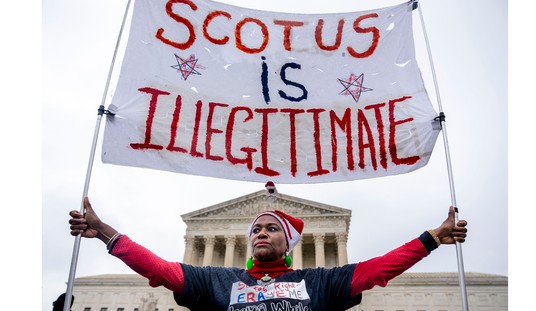Honestly, I can’t tell. I don’t think anyone knows what to expect from them but they meet today to discuss whether or not they will, essentially, allow the delegates to remain unbound and vote their conscience about one Donald John Trump, or if they will abide by the states’ rules regarding bound delegates and hold them to the nominee if they supported him during the primaries.
The Platform Committee finished its work Tuesday evening and the Rules Committee will gather for the first time for an orientation tonight. The Rules Committee, which will consider whether to unbind delegates from presumptive nominee Donald Trump, formally begins its session Thursday morning. It is not expected to address the “binding” question until Friday.
There’s been a lot of discussion in wonky circles about whether or not the delegates are actually bound; in fact their’s a great, short, digital book about it (but more on that in a minute), but one of the more interesting questions concerns, if the rules committee determines that they are free to vote their conscience, if they are MORALLY prevented from doing so. In other words, are they going back on a promise and does this do some small, incremental damage to the proud history of the GOP?
Jay Cost of the Weekly Standard wrote a really nice piece yesterday arguing that they are, indeed, free morally to vote their conscience. In fact, it could be argued they are morally required to do so, now that much of Trump’s character and his inability to “act more presidential” has come to light. And there’s history to back these things:
The Trump campaign and the leadership of the Republican National Committee are working hard to pressure delegates to vote for Trump. The race is over, they say. The voters have rendered their judgment. Delegates do not have the right to nullify this verdict. Now is the time to rally around Trump and unify the party.
Trump and the RNC leadership are wrong. The delegates should feel free to vote their consciences, and the rules and history of the Republican National Convention support their right to do so.
And here’s where the book “Unbound: The Conscience of a Republican Delegate” comes in.
A short little work of merely 124 pages, it chronicles the history of the GOP as it climbed out of the fire of the burning Whig party and, most importantly, it’s tendency — unlike the Democrats — NOT to bind its delegates as a matter of conscience and morality.
The authors, Curley Haugland and Sean Parnell, wrote an op-ed for The Hill laying out the case for why delegates to the GOP convention should be unbound. To whit — they always have been as a matter of principle.
Republican delegates to the national convention have always been unbound by national party rules, with the single exception. The issue was decisively settled in 1876 when delegates voted 395 to 353 to uphold past rulings stating that delegates could not be bound to vote against their conscience. Following the vote, the chairman of the convention summarized the party’s position by saying “[I]t is he right of every individual member thereof to vote his individual sentiments.”…
The only time delegates have been bound by primary results or anything else was in 1976, when the campaign of President Gerald Ford pushed through a rule requiring votes from nineteen states with laws purporting to bind delegates be announced and recorded as if those laws were valid. It was widely understood at the time those laws were unconstitutional as a result of a recent Supreme Court ruling, but the rule was sufficient to bind delegates’ votes for the first time in Republican National Convention history.
The gambit seemed to pay off, as it helped Ford defeat his challenger, former California Gov. Ronald Reagan. At the 1980 convention the rule change pushed through by Ford was eliminated, and the rule reverted back to essentially the same language as the rule first adopted at the 1880 convention. The rule remains largely identical today.
I asked Parnell (he’s a former boss) about the GOP convention and if he thought any of this would make a difference when it came to the current presumptive nominee.
“I fully expect that the language of the rule in question, 37(b) which is largely identical to what James A. Garfield wrote and was adopted at the 1880 convention, will remain the same,” Parnell said of what the Rules Committee may decide today and tomorrow. “The question is, will the party honor the rule as written or will it embrace a ‘living, breathing’ interpretation that turns the plain language, intent, and 136 years of precedent on its head?”
For his part, Parnell agreed with my suggestion that binding the delegates seemed like a departure from he spirit of representative democracy and more like a move toward what the Democrats favor; that is, pure party rule (think Superdelegates and the coronation of Lady Clinton).
“I think that’s exactly right – the Republican National Convention is intended as a deliberative body, not a rubber-stamp formality, and is similar to the way other deliberative bodies work in a representative democracy such as Congress. I think the Ford move was terrible for the party, fortunately the party recognized this error in 1980 and removed the language that bound delegates to vote according to primary results regardless of their conscience,” he said.
So where does that leave the 2016 convention as it applies to Trump? Parnell’s entire answer to that question is worth the read because he believes that the delegates will absolutely be allowed to vote their conscience — and their conscience will likely lead them to Trump:
“Assuming the Republican National Convention upholds its longstanding rule and custom of allowing delegates to vote their conscience, I think Trump will still probably be the nominee – a lot of delegates clearly favor him, and a lot of delegates that aren’t necessarily keen on him will, in consulting their conscience, conclude he’s the best nominee because he ran the best campaign in the lead-up to the convention. But nobody should ever be forced to vote contrary to what their conscience dictates, and those delegates who cannot in good conscience vote for Trump should be allowed to abstain or vote for someone else, even if it causes some modest embarrassment for Trump. Squashing dissent is the surest route to long-term disaster for the Republican Party, as it shows distrust by the party leadership for grassroots activists.”
With respect to Sean, I’m not sure I’m totally on board with that. There’s been a whole bunch of whipping happening by the anti-Trump groups and some concerns that Trump will do a lot of post-dumping damage to whomever might replace him (the man is known for his litigiousness). And word that Virginia delegates can’t face prosecution in the state if they choose not to vote for Trump, despite being bound by state rules, at least legally frees them up to vote their conscience.
So I guess it’s all up to the collective conscience of the GOP. What they decide will ultimately say a great deal about what the guiding principles are now for the Grand Old Party.














Join the conversation as a VIP Member